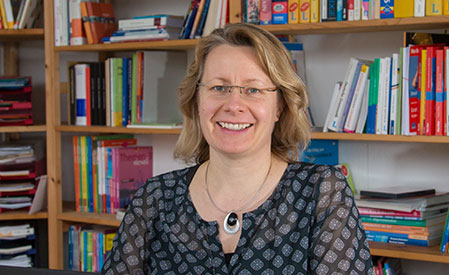What we offer
Levels
Common reference levels
The Common European Framework divides learners into three broad divisions which can be divided into six levels.
The CEFR describes what a learner is supposed to be able to do in reading, listening, speaking and writing at each level.
A - Basic User
A1 - Breakthrough or beginner
Description
- Can understand and use familiar everyday expressions and very basic phrases aimed at the satisfaction of needs of a concrete type.
- Can introduce him/herself and others and can ask and answer questions about personal details such as where he/she lives, people he/she knows and things he/she has.
- Can interact in a simple way provided the other person talks slowly and clearly and is prepared to help.
Exam
Goethe Institute: Start Deutsch 1 (Allgemein), FIT in Deutsch 1 (Jugendliche)
Telc: telc Deutsch A1, telc Deutsch A1 für Zuwanderer, telc Deutsch A1 Junior
A2 - Waystage or elementary
Description
- Can understand sentences and frequently used expressions related to areas of most immediate relevance (e.g. very basic personal and family information, shopping, local geography, employment).
- Can communicate in simple and routine tasks requiring a simple and direct exchange of information on familiar and routine matters.
- Can describe in simple terms aspects of his/her background, immediate environment and matters in areas of immediate need.
Exam
Goethe-Institute: Start Deutsch 2 (Allgemein), FIT in Deutsch 2 (Jugendliche)
Telc: telc Deutsch A2, telc Deutsch A2 + Beruf, telc Deutsch A2 Schule
B - Independent User
B1 - Threshold or intermediate
Description
- Can understand the main points of clear standard input on familiar matters regularly encountered in work, school, leisure, etc.
- Can deal with most situations likely to arise whilst travelling in an area where the language is spoken.
- Can produce simple connected text on topics which are familiar or of personal interest.
- Can describe experiences and events, dreams, hopes & ambitions and briefly give reasons and explanations for opinions and plans.
Exam
Goethe-Institute: Goethe-Zertifikat B1, DSD I
Telc: Zertifikat Deutsch/ telc Deutsch B1, telc Deutsch B1 + Beruf, Deutsch B1 Schule, Deutsch B1 – B2 Pflege
B2 - Vantage or upper intermediate
Description
- Can understand the main ideas of complex text on both concrete and abstract topics, including technical discussions in his/her field of specialisation.
- Can interact with a degree of fluency and spontaneity that makes regular interaction with native speakers quite possible without strain for either party.
- Can produce clear, detailed text on a wide range of subjects and explain a viewpoint on a topical issue giving the advantages and disadvantages of various options.
Exam
Goethe-Institute: Goethe-Zertifikat B2: Zertifikat Deutsch für den Beruf; Deutsche Sprachprüfung für den Hochschulzugang Stufe 1 (DSH-1);Europa-Zertifikat B2, Zertifikat Deutsch für den Beruf (ZDfB)
Telc: telc Deutsch B2, telc Deutsch B2 + Beruf, Deutsch B2 Medizin Zugangsprüfung, telc Deutsch B2-C1 Medizin
C - Proficient User
C1 - Effective Operational Proficiency or advanced
Description
- Can understand a wide range of demanding, longer texts, and recognise implicit meaning.
- Can express him/herself fluently and spontaneously without much obvious searching for expressions.
- Can use language flexibly and effectively for social, academic and professional purposes.
- Can produce clear, well-structured, detailed text on complex subjects, showing controlled use of organisational patterns, connectors and cohesive devices.
Exam
Goethe-Institute: Goethe-Zertifikat C1, Zertifikat des Goethe-Instituts in Zusammenarbeit mit dem Deutschen Industrie- und Handelskammertag (DIHK) und den Carl Duisberg Centren (CDC): Prüfung Wirtschaftsdeutsch International, UNIcert III, DSD II. 5, Deutsche Sprachprüfung für den Hochschulzugang Stufe 2 (DSH-2)
Telc: telc Deutsch C1, telc Deutsch C1 + Beruf, telc Deutsch C1 Hochschule
C2 - Mastery or proficiency
Description
- Can understand with ease virtually everything heard or read.
- Can summarise information from different spoken and written sources, reconstructing arguments and accounts in a coherent presentation.
- Can express him/herself spontaneously, very fluently and precisely, differentiating finer shades of meaning even in the most complex situations.
Exam
Goethe-Institute: Goethe-Zertifikat C2: Großes Deutsches Sprachdiplom (GDS), UNIcert IV; Deutsche Sprachprüfung für den Hochschulzugang Stufe 3 (DSH-3)
Telc: telc Deutsch C2

